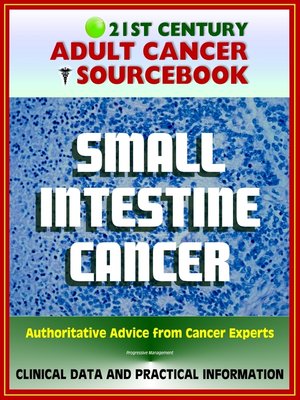21st Century Adult Cancer Sourcebook
ebook ∣ Small Intestine Cancer--Clinical Data for Patients, Families, and Physicians
By Progressive Management

Sign up to save your library
With an OverDrive account, you can save your favorite libraries for at-a-glance information about availability. Find out more about OverDrive accounts.
Find this title in Libby, the library reading app by OverDrive.



Search for a digital library with this title
Title found at these libraries:
| Library Name | Distance |
|---|---|
| Loading... |
Authoritative information and practical advice from the nation's cancer experts about small intestine cancer includes official medical data on signs, symptoms, early detection, diagnostic testing, risk factors and prevention, treatment options, surgery, radiation, drugs, chemotherapy, staging, biology, prognosis, and survival, with a complete glossary of technical medical terms and current references.
Starting with the basics, and advancing to detailed patient-oriented and physician-quality information, this comprehensive in-depth compilation gives empowered patients, families, caregivers, nurses, and physicians the knowledge they need to understand the diagnosis and treatment of small intestine cancer.
Comprehensive data on clinical trials is included - with information on intervention, sponsor, gender, age group, trial phase, number of enrolled patients, funding source, study type, study design, NCT identification number and other IDs, first received date, start date, completion date, primary completion date, last updated date, last verified date, associated acronym, and outcome measures.
There are five types of small intestine cancer. The types of cancer found in the small intestine are adenocarcinoma, sarcoma, carcinoid tumors, gastrointestinal stromal tumor, and lymphoma. This summary discusses adenocarcinoma and leiomyosarcoma (a type of sarcoma). Adenocarcinoma starts in glandular cells in the lining of the small intestine and is the most common type of small intestine cancer. Most of these tumors occur in the part of the small intestine near the stomach. They may grow and block the intestine. Leiomyosarcoma starts in the smooth muscle cells of the small intestine. Most of these tumors occur in the part of the small intestine near the large intestine. Diet and health history can affect the risk of developing small intestine cancer.
Risk factors for small intestine cancer include the following:
Possible signs of small intestine cancer include abdominal pain and unexplained weight loss. These and other symptoms may be caused by small intestine cancer or by other conditions. A doctor should be consulted if any of the following problems occur:
Extensive supplements, with chapters gathered from our Cancer Toolkit series and other reports, cover a broad range of cancer topics useful to cancer patients. This edition includes our exclusive Guide to Leading Medical Websites with updated links to 81 of the best sites for medical information, which let you quickly check for updates from the government and the best commercial portals, news sites, reference/textbook/non-commercial portals, and health organizations. Supplemental coverage includes:
Levels of Evidence for Cancer Treatment Studies
Glossary of Clinical Trial Terms
Clinical Trials Background Information and In-Depth Program
Clinical Trials at NIH
How To Find A Cancer Treatment Trial: A Ten-Step Guide
Taking Part in Cancer Treatment Research Studies
Access to Investigational Drugs
Clinical Trials Conducted by the National Cancer Institute's Center for Cancer Research at the National Institutes of Health Clinical Center
Taking Time: Support for People with Cancer







